Politician Says Russia Didn’t Want Iran Deal Before Invasion Of Ukraine
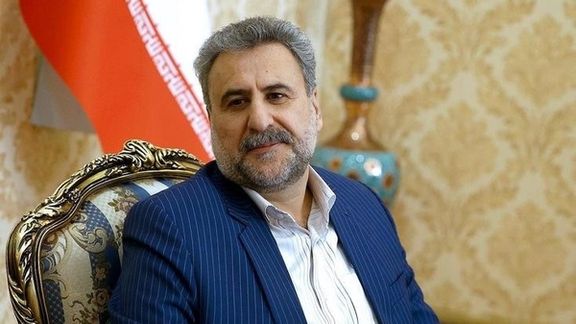
A former senior Iranian lawmaker, Heshmatollah Falahatpisheh, says the crimes of Russian President Vladimir Putin are covered up in Iran.

A former senior Iranian lawmaker, Heshmatollah Falahatpisheh, says the crimes of Russian President Vladimir Putin are covered up in Iran.
Falahatpisheh, the former chairman of parliament's national security and foreign policy committee, told Rouydad24 website on Monday that there could be legal action against Putin by the Rome Statute of the International Criminal Court.
He said Putin fears that if he can’t win the war, there will be a day when he and his commanders are put on trial by the Russians themselves, like what the Yugoslav people did to their political leaders.
Falahatpisheh said the prospect of this invasion is dark, because there is the ambition of a great dictator named Putin, adding that he has already played all the possible cards to keep himself in power, such as changing the constitution for lifelong rule.
He claimed that the mission of Moscow’s top negotiator in Iran nuclear talks in Vienna, Mikhail Ulyanov, was that no agreement would be signed before the invasion of Ukraine. Even after that Russians have demanded a US guarantee that Ukraine sanctions would not hurt trade with Tehran, something France calls blackmail.
Iran's top officials’ including Supreme Leader Ali Khamenei and President Ebrahim Raisi have expressed support for the Russian invasion of Ukraine blaming the United States for the crisis while hundreds of Iranians on social media have been expressing anger at the invasion and criticizing the government’s position.
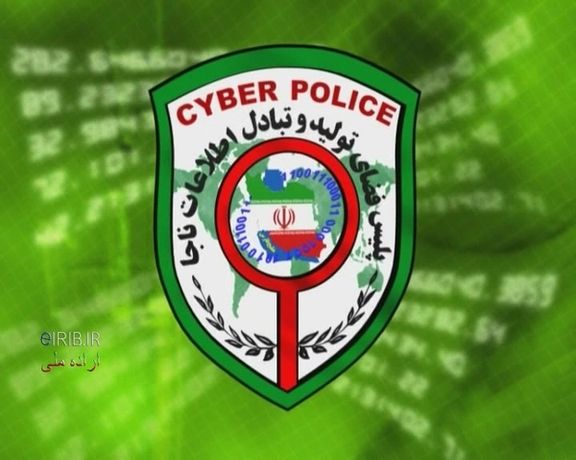
Iran’s parliament has agreed to allocate 2 percent of income from all bank transaction fees to the cyber police unit that plays a major role in Internet censorship.
During a Monday session to discuss next year’s budget bill, the lawmakers approved some notes and clauses that will require banks and credit institutions to give two percent of their total proceeds from the electronic banking system transactions to strengthen the cyber police, also known by its Persian acronym FATA.
The unit was established in 2008 to help fight cyber crime but it plays a major role in censoring the internet by blocking thousands of websites and social media apps in a bid to control the flow of information. The unit is usually controlled by an IRGC official.
In cooperation with the Central Bank of Iran, the treasury will collect the money and give it to the Law Enforcement Force of the Islamic Republic, which will spend it on different sections of the cyber police across the country.
Transaction fees in Iran are small but an estimate shows FATA can receive at least $10 million from the scheme approved by parliament.
The allocation of the additional budget to FATA police, which is the most important force in monitoring cyberspace has increased speculations about the possibility of approving a controversial bill to further restrict access to the Internet.
Iranians were outraged last week when a group of 18 hardliners in a parliament committee claimed that they had ratified a bill to further restrict internet and social media access.
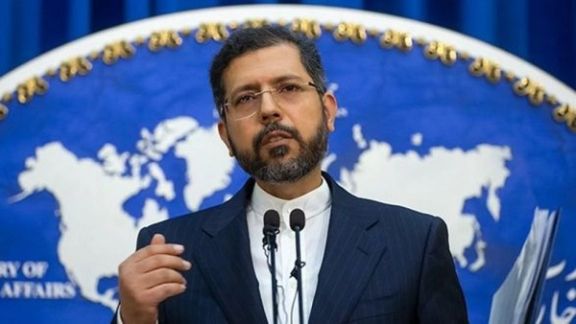
Iran’s foreign ministry said Monday that Tehran is awaiting clarification from Moscow over its demand to be exempted from Ukraine sanctions in its dealing with Iran.
"We have seen and heard about [Russian Foreign Minister Sergei] Lavrov's comments in the media. We are awaiting to hear its details through diplomatic channels," the ministry’s spokesman Saeed Khatibzadeh said at his weekly press conference.
The comment showed that Tehran is in an uncomfortable position with its close ally making demands from the United States amid nuclear talks crucial for Iran, apparently without coordination.
Three days have passed since Russian foreign minister Sergei Lavrov said that international sanctions related to Ukraine had created "problems from the point of view of Russia's interests" regarding the restoration of the 2015 deal, Joint Comprehensive Plan of Action (JCPOA), and that sanctions on Russia could complicate Moscow's involvement in Tehran's civilian nuclear program as well as arms sales to Iran.
Khatibzadeh made the comment when asked by a reporter if Lavrov's demands did not mean taking the Iran nuclear talks hostage to its own interests. Iran’s Tasim news agency in its report mentioned the loaded question, a rare practice for government-run media when an issue relates to an ally.
This was Tehran's first official reaction to Lavrov's controversial remarks which some say amounts to ruining prospects of a deal to restore the JCPOA in the coming days by pulling out of the talks. "We haven't heard about Russia's intention to withdraw from the JCPOA, this is only media speculation," Khatibzadeh said and insisted that Russia should raise any concerns it may have "within the Vienna talks".
He said Russia's concerns over Ukraine sanctions are "understandable" but appeared to be suggesting that in regard to Iran and the restoration of the JCPOA, Russia could demand exemption from US sanctions only in connection with its nuclear cooperation with Iran withing the JCPOA framework.
"Vienna participants act and react based on [their own] interests and it's understandable," Ali Shamkhani, Secretary of Iran's Supreme National Security Council, said in a tweet Monday. "Our interactions with 4+1 are also solely driven by our people's interests. Thus, we're assessing new elements that bear on the negotiations and will accordingly seek creative ways to expedite a solution," he added.
Khatibzadeh also insisted that the process in Vienna continues "along its own path". "It's clear that Iran's peaceful nuclear cooperation with other countries, including Iran's peaceful cooperation with Russia and China, should not be restricted or affected by any sanctions. We understand [Lavrov's] remarks within the same context," Khatibzadeh told reporters.
"The path of Vienna [talks] is very clear… In the past few months, we have made every effort for the dossier to proceed with a meaningful distance from other international dossiers," he said. "We are in difficult negotiations. We have seen different reactions from different actors on different days. We are not alarmed by the positions of countries [involved in the talks], whether some stances announced by [some] countries in the past or what we are hearing these days," he added.
khatibzadeh also said that Russia's approach towards reaching an agreement in Vienna has been constructive "so far" and reiterated that Iran is awaiting to hear further details from the Russian side in Vienna, "if there is any".
The Iranian delegation's media advisor, Mohammad Marandi, told Al Jazeera on Sunday that Iran is "waiting for verification from Russians" about their demands from the US because "it's not quite clear exactly what the Russians mean".
US Secretary of State Antony Blinken on Sunday dismissed Russian demands of guarantees that Ukraine sanctions would not hamper its trade with Iran. They "just are not in any way linked together, so I think that's irrelevant," he said, adding that it is in the interests of both Russia and the US that Iran is not able to "have a nuclear weapon or the capacity to produce a weapon on very, very short order."
Some media in Tehran and many Iranian social media users have interpreted Lavrov's remarks Saturday as "blackmail" and "taking the JCPOA hostage" to secure Russia's own interests.
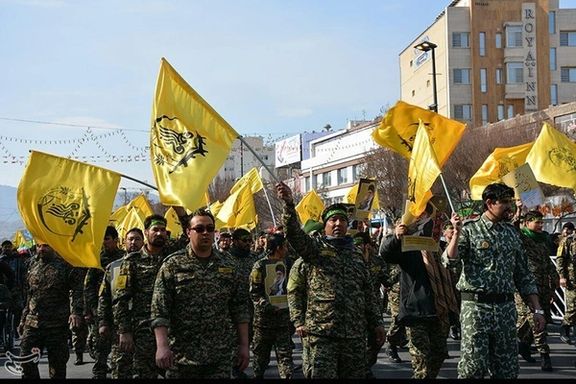
Russia is recruiting fighters in Syria to fight in Ukraine, The Wall Street Journal reported, a move that can bring Iran-backed fighters into the war in Europe.
There are a myriad of groups fighting in Syria, including local persons fighting for Russia’s ally Iran and the Bashar al-Assad’s forces, the Lebanese Hezbollah, Afghan and Iraqi fighters recruited and paid by Iran, and Jihadist groups opposed to Iran and Russia.
The report, quoting US officials, did not provide details as to whether Syrian citizens are being recruited or foreign fighters. But if Russia has indeed decided it needs foreign fighters in Ukraine it might not hesitate to send non-Syrians recruited by Iran to Europe.
Iran entered the Syrian conflict from its early days in 2011 and in more than a decade has sent tens of thousands of Afghans, Iraqis and even Pakistanis to fight in Syria. In addition, the Iran-backed Hezbollah in neighboring Lebanon has been fighting in Syria alongside Iran and Russia for almost a decade.
Fighters in Syria not only have long experience in battle but many have fought in urban battles such as the capture of Aleppo from Assad’s opponents in 2016.
Other reports say that Moscow is also sending mercenaries from Russia to fight in Ukraine.
Many foreigners have also volunteered to fight on the Ukrainian side.
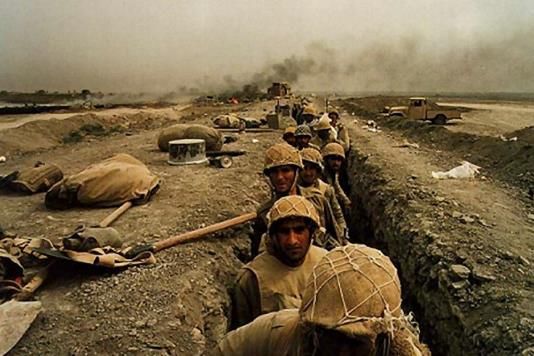
Iranians and veteran groups have slammed a plan by their government to provide assistance to Iraqis who fought in the 1980s war against Iran.
During his visit to Baghdad last week, the head of Iran’s Foundation of Martyrs and Veterans Affairs, Amir-Hossein Ghazizadeh Hashemi, signed a memorandum of understanding to provide a wide range of services to Iraqi veterans of the Iraq-Iran war and the families of Iraqis killed during the eight-year conflict.
The Iranian side will build homes in Iraq and set up a branch of Iran’s Shahed University to admit students from the families of Iraqi servicemen killed and veterans. The MoU is also set to pave the ground for the admission of Iraqis to universities in Iran.
Iran has been spending a lot of resources in Iraq to build influence.
Many Iranians have criticized the move, saying the Islamic Republic can barely provide the needed services for Iranian veterans and their families.
The Society of Devotees of the Islamic Revolution has issued a statement to condemn the agreement, questioning the justification for such a measure, and urging the resignation of Ghazizadeh Hashemi.
The society described the Iraqi veterans as “the murderers of the Iranian sons”, asking, “Have we really reached a point where the place of the murderer and the martyr has changed? When you are incapable of taking care of Iranian veterans, how have you announced readiness to provide such services to the Iraqis?”
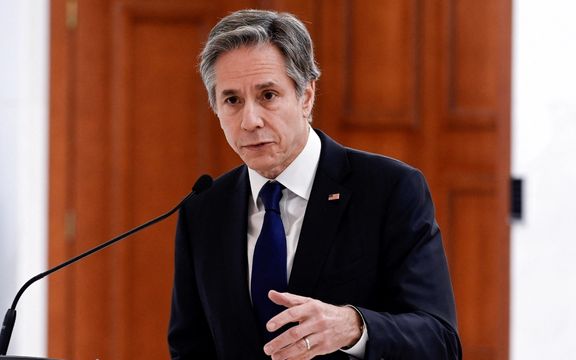
US Secretary of State Antony Blinken has dismissed Russian demands of guarantees that Ukraine sanctions would not hamper its relations with Iran.
Moscow’s demand was two pronged. First, it alluded to its ability to play its role in an imminent nuclear deal with Iran, and second to have economic and military ties with Tehran without being hampered by recent sanctions imposed for its invasion of Ukraine.
A day after Russian Foreign Minister Sergei Lavrov demanded written guarantees from Washington to that effect, Blinken said Sunday that the Ukraine sanctions have nothing to do with a potential nuclear deal with Iran.
They "just are not in any way linked together, so I think that's irrelevant," he said, adding that it is in the interests of both Russia and the US that Iran is not able to "have a nuclear weapon or the capacity to produce a weapon on very, very short order."
Lavrov said Saturday that international sanctions against Russia had created "problems from the point of view of Russia's interests" regarding the restoration of the 2015 Iran nuclear deal, Joint Comprehensive Plan of Action (JCPOA), and that sanctions on Russia could complicate Moscow's involvement in Tehran's civilian nuclear program as well as arms sales to Iran.
A European diplomat who spoke to Iran International in Vienna on condition of anonymity said Saturday that Russia’s demand of US guarantees over Ukraine sanctions not impeding its dealings with Iran go farther than Tehran’s nuclear issue.
Iran's foreign ministry, as well as other officials and government-run media have not shown any reaction to Lavrov's remarks yet but the Iranian delegation's media advisor, Mohammad Marandi, told Al Jazeera Sunday that Iran is "waiting for verification from Russians" about their demands from the US because "it's not quite clear exactly what the Russians mean".
The demand is relevant if it is linked to the actual implementation of the JCPOA, especially with regards to the Iranian nuclear program itself, Marandi said. "Because Russians play a role in resolving issues, they will be dealing with enriched uranium and other elements of the nuclear program."
Abolfazl Amuei, a member of the Iranian parliament's National Security and Foreign Policy Committee, said Sunday that Iran had not asked the Russian side to demand for guarantees from the US. “This is in fact something that Russia and the US must resolve between themselves because it is related with the relations between them in regards to Ukraine."
"Iran has made every effort to distance the Vienna talks from events in Eurasia, Eastern Europe and Ukraine developments. Therefore, Americans must be able to satisfy all parties' wishes on their own," Amuei said.
Some media in Tehran and many Iranian social media users interpreted Lavrov's remarks Saturday as "blackmail" and "taking the JCPOA hostage" to secure Russia's own interests.
Speaking to conservative Entekhab website Sunday, a former Iranian diplomat to the United Nations, Kourosh Ahmadi, said Russia may be aiming at delaying the restoration of the JCPOA and putting pressure on the West.
Restoration of the JCPOA at this time is not in Russia's interest because oil markets' need for Russian oil will decrease if sanctions on Iran are lifted and Iranian oil becomes available in international markets, Ahmadi said. "Oil prices will also drop by 10 to 15 percent. Therefore, it is in Russia's interest to delay the return of Iran's oil to markets as long as possible," he added.